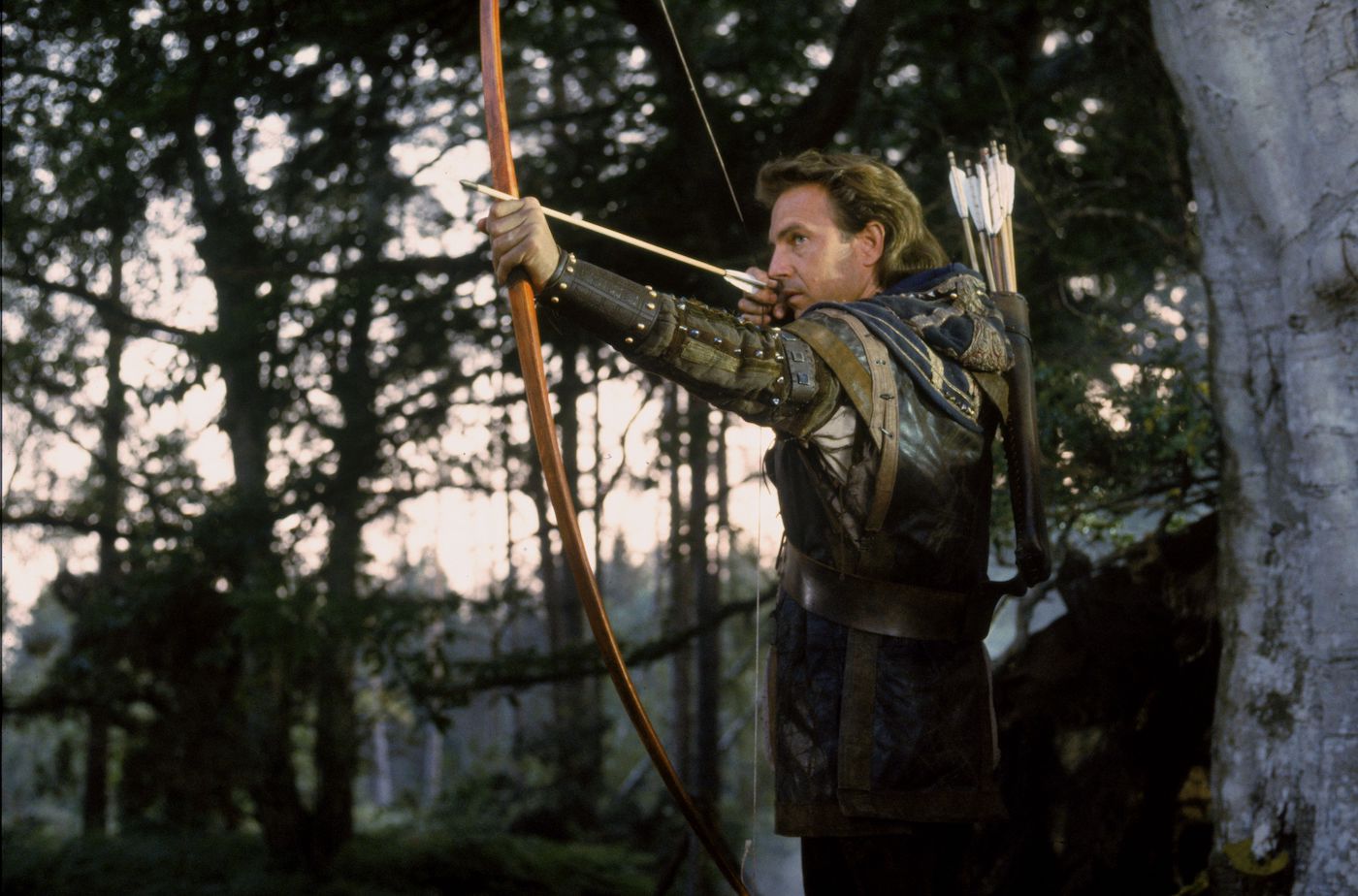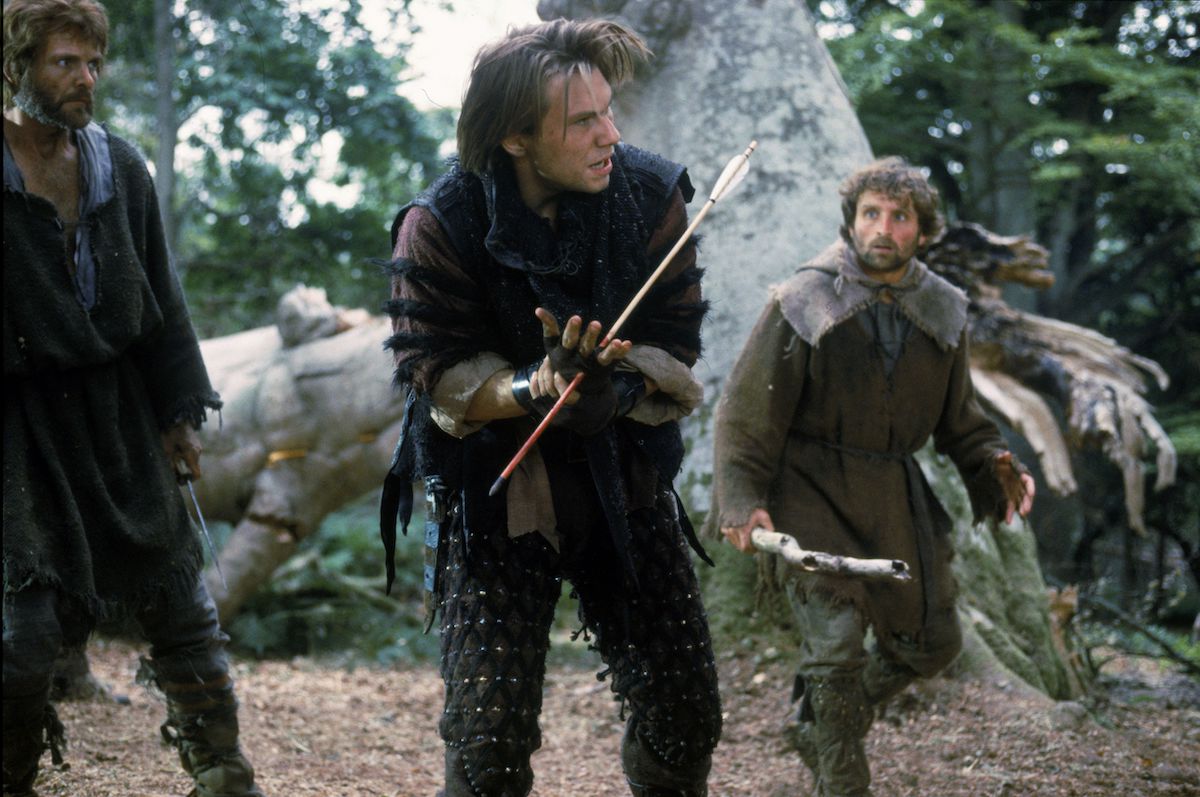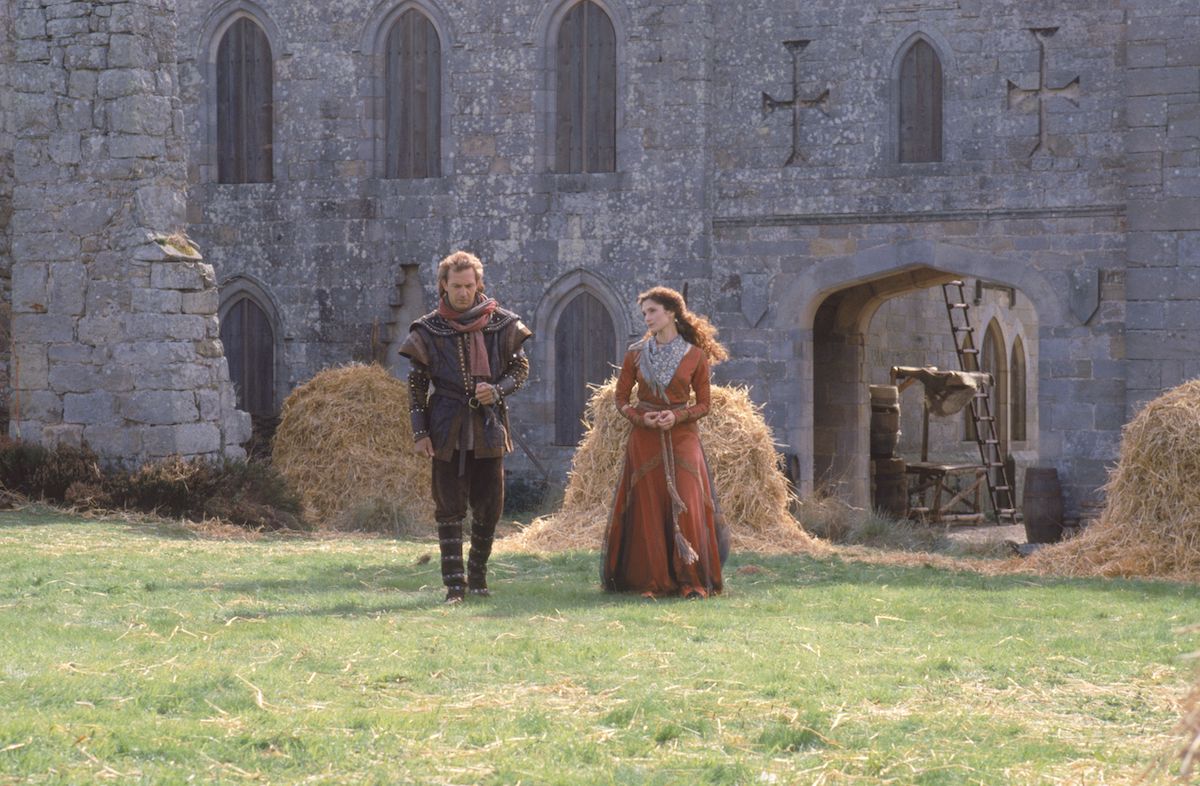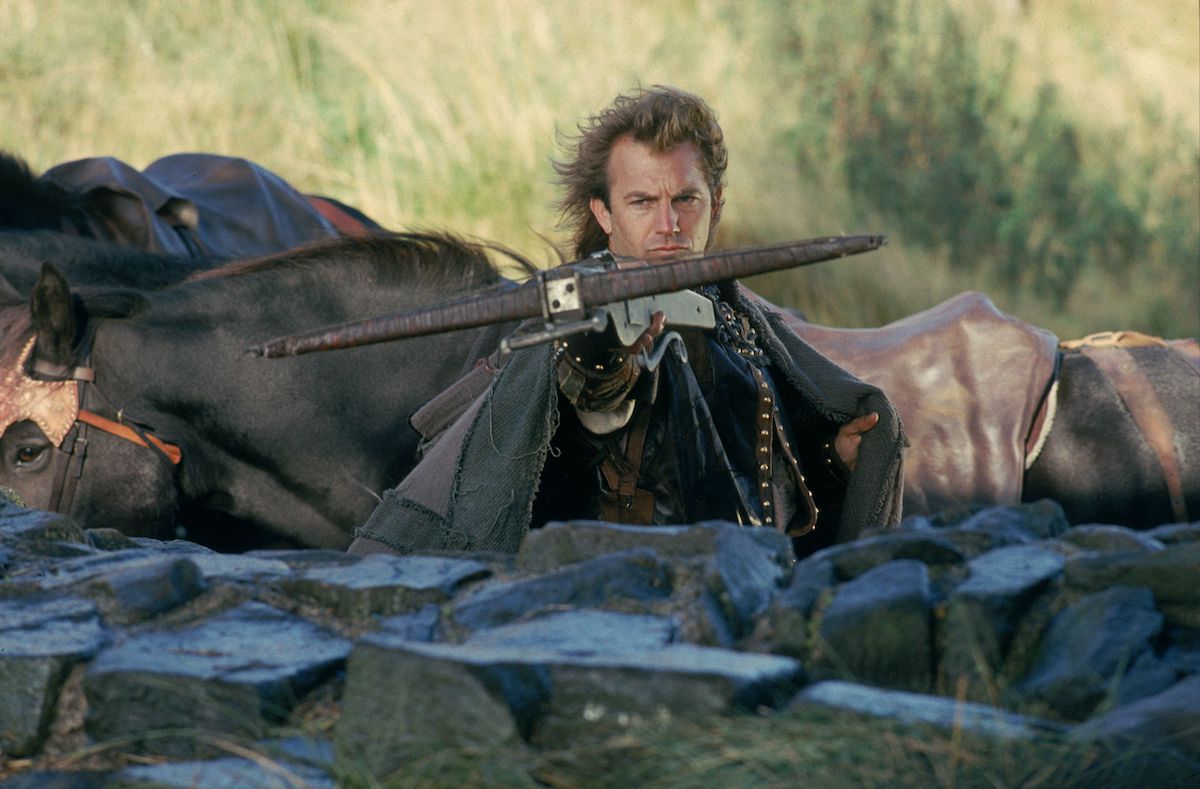ROBIN HOOD: PRINCE OF THIEVES (1991)
Robin Hood decides to fight back as an outlaw when faced with the tyranny of the Sheriff of Nottingham.

Robin Hood decides to fight back as an outlaw when faced with the tyranny of the Sheriff of Nottingham.


Kevin Reynolds’ hugely successful Robin Hood: Prince of Thieves remains the last decent adaptation of the English folk story made by Hollywood, as the two significant ones that followed in 2010 (directed by Ridley Scott) and 2018 (directed by Otto Bathurst) both flopped. What did this comparatively humble version do better? A few things we’ll get into, but it’s also true audiences aren’t as enamoured by this legend these days. It’s hard to radically update the core concept after a certain point, so Prince of Thieves marks the last time it felt like a classic tale was reimagined in a manner that didn’t work against its roots as a good-vs-evil romp around forests and castles in the spirit of Errol Flynn.
Pen Densham and his producing partner John Watson devised a new take on Robin Hood that gave the character a stronger political edge, reimagining the folk hero as a Crusader in Jerusalem whose experiences turn him into a socially conscious rebel upon his return to England. Morgan Creek immediately bought the screenplay and the project was fast-tracked in order to beat other Robin Hood adaptations already in development (including one with John McTiernan set to film in California). Kevin Reynolds (Red Dawn) was then hired to direct, despite his last few pictures not turning a profit, but his unlikely involvement convinced Kevin Costner to star because Reynolds had recently bonded with him working as an uncredited Second Unit Director on Dances With Wolves (1990).

Robin Hood: Prince of Thieves opens against expectations in the Middle East, with Robin (Costner) languishing in an Ayyubid prison about to get his hand chopped off, only to escape after freeing a Moor named Azeem (Morgan Freeman) who vows to accompany him until he can repay his life-debt. Arriving safely back in England, with King Richard “The Lionheart” still off fighting in the Crusades, Robin discovers his father Lord Locksley (Brian Blessed) has been murdered by the Sheriff of Nottingham (Alan Rickman), who’s now plotting to overthrow the throne with the help of his devious cousin Guy of Gisbourne (Michael Wincott) and the premonitions of an old witch (Geraldine McEwan). Determined to rebuild his life and avenge his father’s death, Robin joins a band of outlaws in Sherwood Forest and meets the beautiful sister of one of his old prison inmates who didn’t make it, Maid Marian (Mary Elizabeth Mastrantonio).
Fundamentally, Robin Hood: Prince of Thieves tells a familiar story with a few changes perhaps inspired by the Gulf War reviving the west’s awareness of that region and its history. Robin’s personal connection to the Crusades is something that now appears regularly in retellings of Robin Hood, but it began here with the culture clash of Azeem finding his presence as a dark-skinned tattooed foreigner unnerves the locals—especially Friar Tuck (Michael McShane), who believes his religion’s heresy. Many adaptations since have been more inclusive with non-white characters involved in the story without their ethnicity even being mentioned (the BBC’s Robin Hood 2006 TV series even made Friar Tuck black), but I prefer the approach taken here with Robin more enlightened because of his experiences overseas. Seeing how his band of likeable but ignorant ‘men men’ adapt to an unusual interloper like Azeem also adds welcome conflict to the group.

Of course, one can’t fail to avoid mentioning Alan Rickman’s turn as the Sheriff in this movie. As one of the few native English actors in the film (strangely), Rickman steals every scene he’s in and his performance was deservedly hailed as the prime reason to watch Prince of Thieves. Relatively fresh from playing the villain in Die Hard (1987), Rickman cornered the market for English antagonists who are both believably dangerous but gleefully roguish with it. He knew the Sheriff is a character it’s easy to squeeze laughs from, so moments like when he cancels Christmas aren’t far from what you’d expect to see in a seasonal pantomime. Rickman apparently asked his friends Ruby Wax and Peter Barnes to punch up his lines, which Reynolds allowed. And yet the Sheriff isn’t a ludicrous figure of fun whose threat can’t be taken seriously, as there are plenty of moments when he’s genuinely sinister and doing unpleasant things. The Extended Cut of the film goes even further in that respect—perhaps too far—with extra scenes painting the Sheriff as a much darker figure than the Theatrical Cut…
Costner himself was criticised for playing Robin Hood in his natural American accent, although there are hints of an English lilt between scenes (presumably during a filming period when there was disagreement over this choice with the director). As mentioned, this is a surprisingly “American” version of Robin Hood because so few native actors were cast in the major roles, with Little John (Nick Brimble) the only one that stands out besides the Sheriff. Azeem is a new character who takes time away from Robin’s traditional friendships, while Will Scarlett (Christian Slater), Friar Tuck, and Marian are all played by Americans. It didn’t and still doesn’t bother me too much, although it’s a shame only Michael Wincott (The Crow) attempts an English accent, although perhaps the film would have been ruined by so many Americans doing bad English accents.

What continues to work about Prince of Thieves is how small-scale it feels, especially in today’s era of more overblown entertainment. There aren’t many huge set-pieces or spectacular action sequences. The best we get is a climactic moment when two men are catapulted through the air, with a few big explosions. The rest is traditional sword fights and archery. There’s not even much horse-riding or stealing from the rich! But that’s absolutely fine. Subsequent adaptations often feel too modern in how they’re put together, with people doing things that simply wouldn’t have been possible using 12th-century weapons and structures. Prince of Thieves feels grounded and plausible because the most avant-garde thing it does with the camera is a few ‘arrow POV’ shots. The filmmaking and editing don’t get in the way of the simple entertainment of watching working-class outlaws defeat a rotten Sheriff, exactly as it should be for a simple folk story like Robin Hood.
And it looks wonderful, thanks to extensive location shooting across England and Douglas Milsome’s verdant cinematography. Robin Hood: Prince of Thieves has a beautifully rustic feel, with lots of woodland colours that draw you into this mediaeval world and makes you believe you’re in the past. It’s admittedly odd to native eyes that Robin arrives home on the southern beaches of Sussex, only to be in the far north of England walking along Hadrian’s Wall in the very next scene, but Reynolds rationalised that he simply wanted to showcase the best of England’s scenery and most people wouldn’t be so geographically aware. And he’s right.

If there’s one undeniable downside to Prince of Thieves, it’s easily the weak relationship between Robin and Marian. This is one of literature’s great romances alongside Romeo and Juliet and fuels the emotional heart of most adaptations, but it’s flat and disappointingly handled here. Mary Elizabeth Mastrantonio (The Abyss) makes for a decent Marian and attempts are made to make her a more capable woman than the expected damsel-in-distress (until she becomes one anyway), but there isn’t much romantic heat with Costner. And the film often feels more invested in Robin’s platonic friendships and the Sheriff’s machinations than in developing a sweet romance along the way. But I did like the subversion of Marian sneaking a Robin swimming naked in a pool, as I’m sure it would have been Mastrantonio stripping off for an equivalent scene if Prince of Thieves had been made just a decade prior.
A word must also be given to the tie-in theme song from Bryan Adam, “(Everything I Do) I Do It For You”, which arguably made a bigger cultural impact than the movie. If you’re British and middle-aged you’ll remember this song was inescapable in 1991, staying at No.1 in the UK music charts for a remarkable 16 consecutive weeks (a record it retains to this day). It was a huge success in many other countries and was nominated for ‘Best Original Song’ at the Academy Awards, but sadly lost to “Beaty and the Beast” from the Disney movie. Michael Kamen’s Prince of Thieves soundtrack even lifts the melody of Adams’s song for the romantic scenes, which isn’t something you tend to see very often. While the song became so prevalent a backlash inevitably happened, to this day my abiding memory of Prince of Thieves are moments and clips from the forest-set music video more than anything.
Overall, Robin Hood: Prince of Thieves is a good example of the more humble Hollywood blockbusters of three decades ago, which still feels modern but has one foot in the past where it belongs. There are definitely poor choices, some problematic aspects to the Azeem character, and a few letdowns along the way (the lack of Gladiator-style spectacle may frustrate newcomers watching), yet it captures a mood and develops an atmosphere that’s perfect for this material. And, if nothing else, Alan Rickman gives another memorable turn as a bad guy it’s so good to hate.
USA | 1991 | 143 MINUTES (THEATRICAL CUT) • 155 MINUTES (EXTENDED EDITION) | 1.85:1 | COLOUR | ENGLISH • ARABIC

The great thing about this new 4K Ultra HD release is the chance to enjoy both versions of the film in that quality, and I’d actually never seen the Extended Cut with its extra 12 minutes. I agree with most people that this version gives a bit too much screen time to Rickman, with scenes that make his character darker and less fun, but it’s a fascinating version to watch if you’re more accustomed to the Theatrical Cut.
The picture quality is great considering this isn’t a particularly beautiful film in terms of how it’s shot, as the heavy lifting is done by the natural beauty of the locations. There’s a lot of detail and no sign of DNR making the image appear too smooth and distractingly cleaned up. It looks like the sort of thing you’d expect from early-’90s Hollywood, as scenes sometimes appear a bit soft-focused and the lighting isn’t always perfect, but it’s undoubtedly the best it’s ever looked for home theatres.
The sound hasn’t been given a next-gen upgrade to DTS:X, but there’s a decent DTS-HD Master Audio 5.1 mix that gets the job done. Kamen’s score is the best part of this aural presentation, as the surround effects are a little limited and there’s nothing that truly stands out as demo-worthy. But you get plenty of sword clanging and horse galloping action for your speakers along the way.

director: Kevin Reynolds.
writers: Pen Densham & John Watson (story by Pen Densham).
starring: Kevin Costner, Alan Rickman, Mary Elizabeth Mastrantonio, Christian Slater, Geraldine McEwan, Michael McShane, Brian Blessed, Michael Wincott & Nick Brimble.
